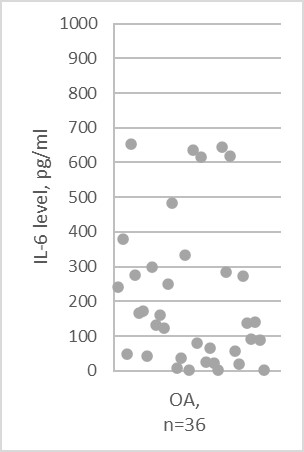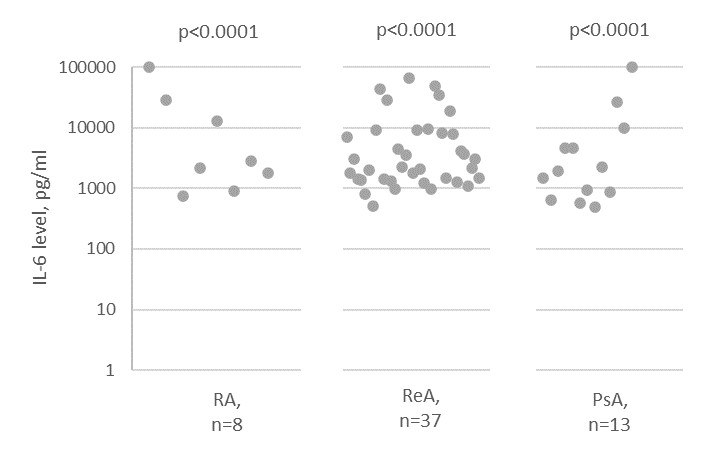Session Information
Date: Friday, November 6, 2020
Title: Miscellaneous Rheumatic & Inflammatory Diseases Poster I: Diagnosis and Testing
Session Type: Poster Session A
Session Time: 9:00AM-11:00AM
Background/Purpose: Persistent synovitis without known markers such as rheumatoid factor (RF), anti-citrullinated protein antibodies (ACPA) as well as without genetic markers as HLAB27 is not uncommon. It is valuable to determine the presents of chronic inflammation and differentiate with age-related changes, what are especially relevant for middle-aged patients with mono- or oligo- arthritis, when dilemma to start disease modifying drugs for inflammatory disease often is present. Interleukin 6 (IL6) is a pleiotropic pro-inflammatory cytokine, which play significant role in the chronic inflammation and autoimmunity. IL6 concentration in synovial fluid was studied in different types of arthritis. The aim of present study to compare concentration of IL6 in synovial fluid in patients with known type of arthritis.
Methods: Synovial fluid was obtained from one hundred one patients with chronic synovitis, mostly from knee joints. IL6 concentration was determined by immunochemical luminescence method.
Results: The median IL6 concentration in synovial fluid in patients with osteoarthritis (OA) was 138.0 pg/ml (IQR 43.4 to 296.0) without any significant differences in primary and secondary osteoarthritis. In inflammatory arthropathies median IL6 level was 2194.0 pg/ml (IQR 1254.0 to 8625.0). Median IL6 concentration in patients with rheumatoid arthritis (RA) was 2516.5 pg/ml, (IQR 1136.0 to 25058.0). There was not significant differences found between seronegative and seropositive RA groups. In reactive arthritis (ReA) median IL6 level was 2281.0 pg/ml (IQR 1392.0 to 8652.0); psoriatic arthritis (PsA) – 1964.0 pg/ml (IQR 754.0 to 7300.0) and ankylosing spondylitis (AS) – 2776.0 pg/ml (IQR 514.7, 3944.0). In group of 19 patients with negative RF, ACPA and HLAB27 inflammatory arthritis (IA) median IL6 level was 2163.0 pg/ml (IQR 822.0 to 7875.0). The pairwise comparison of diagnosis by Kruskal-Wallis Test show statistically significant difference in OA and RA, OA and ReA, OA and PsA groups, p< 0.0001.
Conclusion: IL6 detection in the synovial fluid is useful in arthritis evaluation. The results show that IL6 level over 1000 pg/ml suggest diagnosis of inflammatory arthritis.
 IL-6 concentration in patients with osteoarthritis
IL-6 concentration in patients with osteoarthritis
 IL-6 concentration in patient with inflammatory arthritis
IL-6 concentration in patient with inflammatory arthritis
To cite this abstract in AMA style:
Bukina A, Mihailova A. Interleukin 6 Concentration in Synovial Fluid of Patients with Different Types of Arthritis [abstract]. Arthritis Rheumatol. 2020; 72 (suppl 10). https://acrabstracts.org/abstract/interleukin-6-concentration-in-synovial-fluid-of-patients-with-different-types-of-arthritis/. Accessed .« Back to ACR Convergence 2020
ACR Meeting Abstracts - https://acrabstracts.org/abstract/interleukin-6-concentration-in-synovial-fluid-of-patients-with-different-types-of-arthritis/
